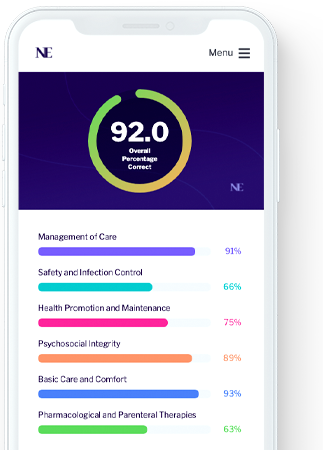Starting Your Nursing Career with Realistic Expectations
Transitioning from nursing student to registered nurse induces countless emotions: sentiments of joy and relief stemming from the accomplishments achieved in school, feelings of peace and excitement since you passed the NCLEX and got hired, a sense of confidence as you look forward to your future career. Despite your fond memories of nursing school and the relief of being done, you might have different emotions as you start your first nursing job. Excitement might be overcome by fear as you start working as a nurse (and getting paid like one) for the first time. Everything else up to this point was hypothetical; now it’s real.
As your start date approaches, fear may creep in as you realize that patients’ lives are in your hands. Or maybe anxiety rears its ugly head as you recognize how much you don’t know about your new job. Will you like the work? How will you get along with your coworkers? Will you make mistakes? The list of concerns goes on.
The orientation process will cover numerous aspects of your job over which you have no control. But you can control your expectations. Here are five realistic expectations that will smooth your transition from nursing student to nurse.
Expectation #1: I Still Have a Lot To Learn
After graduating from nursing school, you can reflect on everything you’ve learned. You know a lot, and you should feel the weight of such an accomplishment. However, even after learning so much about anatomy and physiology, pharmacology, care plans, critical thinking, and assessments, you must realize that you’ve really only seen the tip of the iceberg. Recognize that you still have a lot to learn. Being overconfident when starting a new job is only going to lead to feelings of failure and frustration.
You will have to learn countless on-the-job tasks which are not taught in school: Where do they keep extra oxygen? Who do I contact when a piece of equipment doesn’t work? How do I request a day off or take PTO? Beyond nursing skills, you will have to learn a lot, and that is OK. Ask questions and don’t get frustrated; soon these things will become second nature.
Expectation #2: I Can’t Learn Everything At Once
Trying to learn everything at once feels like drinking water out of a fire hydrant. Water-fountain-portions of learning are easier to take, and you can actually process what you’ve seen. Allow learning to take place naturally. Rushing the process will only require relearning in the future.
A healthy approach is to allow learning to take place through repetition, not memorization. When you do the same skills and processes over and over again, they start to become second nature. Then true learning and memorization can occur. If you expect to have everything memorized right off the bat, you will soon be frustrated and overwhelmed when you can’t deliver.
Expectation #3: My Colleagues Have Expectations, Too
Coming into a new job, you might desire to impress your new colleagues. You want to put your best foot forward and make a quality first impression. But don’t worry about being perfect. Chances are, your colleagues don’t have high expectations of you right off the bat. They know what you’re going through!
Your colleagues would like you to come into the job with an open mind, strong work ethic, and a positive attitude: all things that you can do from day one. They don’t expect you to know everything. Experienced nurses know the sharp learning curve that a new nurse will go through—even a long-time nurse coming into a new job has a lot to learn. Don’t trick yourself into believing that your colleagues have higher expectations for you than they probably do.
Expectation #4: I Don’t Need to Rush New Experiences
When starting a new job, you will feel excitement around certain aspects of the job. You will be anxious to get involved in some experiences right away, but that isn’t always realistic. Working with complex patients, participating in a resuscitation, performing specialized care, and joining a committee are all things that should wait until you get your feet wet. Learning always occurs best when it’s most relevant. When a situation is real instead of hypothetical, your mind is more engaged. Take advantage of each learning opportunity as it comes.
Don’t get caught waiting for certain things to come up: take learning as it comes until you’re competent in your role. Once you become effective in your job, you will find a plethora of new opportunities available for you to participate in.
Expectation #5: I Will Be Better Able to Contribute the Longer I Work at the Job
Nurses are natural helpers, doers, and problem solvers. Initially, you will need to focus on your own practice and staying afloat with your patient assignment. As you gain more experience, you will have time to offer assistance to your coworkers. You might be frustrated that you cannot help in the same way as your more seasoned coworkers. However, you can still run to get supplies and record events for documentation, among other things.
Realistic Expectations Prepare You for Excellence
Setting realistic expectations is the key to a smooth transition from nursing student to registered nurse. Starting your first nursing job is sure to bring challenges, but you can dull the frustrations by having realistic expectations for yourself. Recognize your need to learn, take your time, and give yourself a little grace when it comes to the challenges of a new job. When you come to your career with a pragmatic and down-to-earth perspective, you will be more prepared to succeed and excel.




